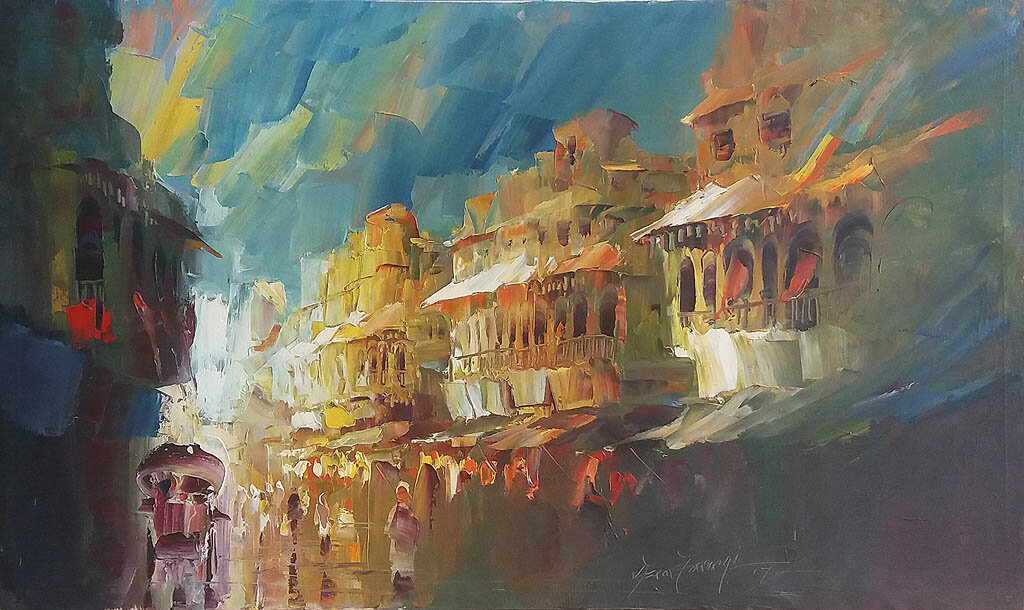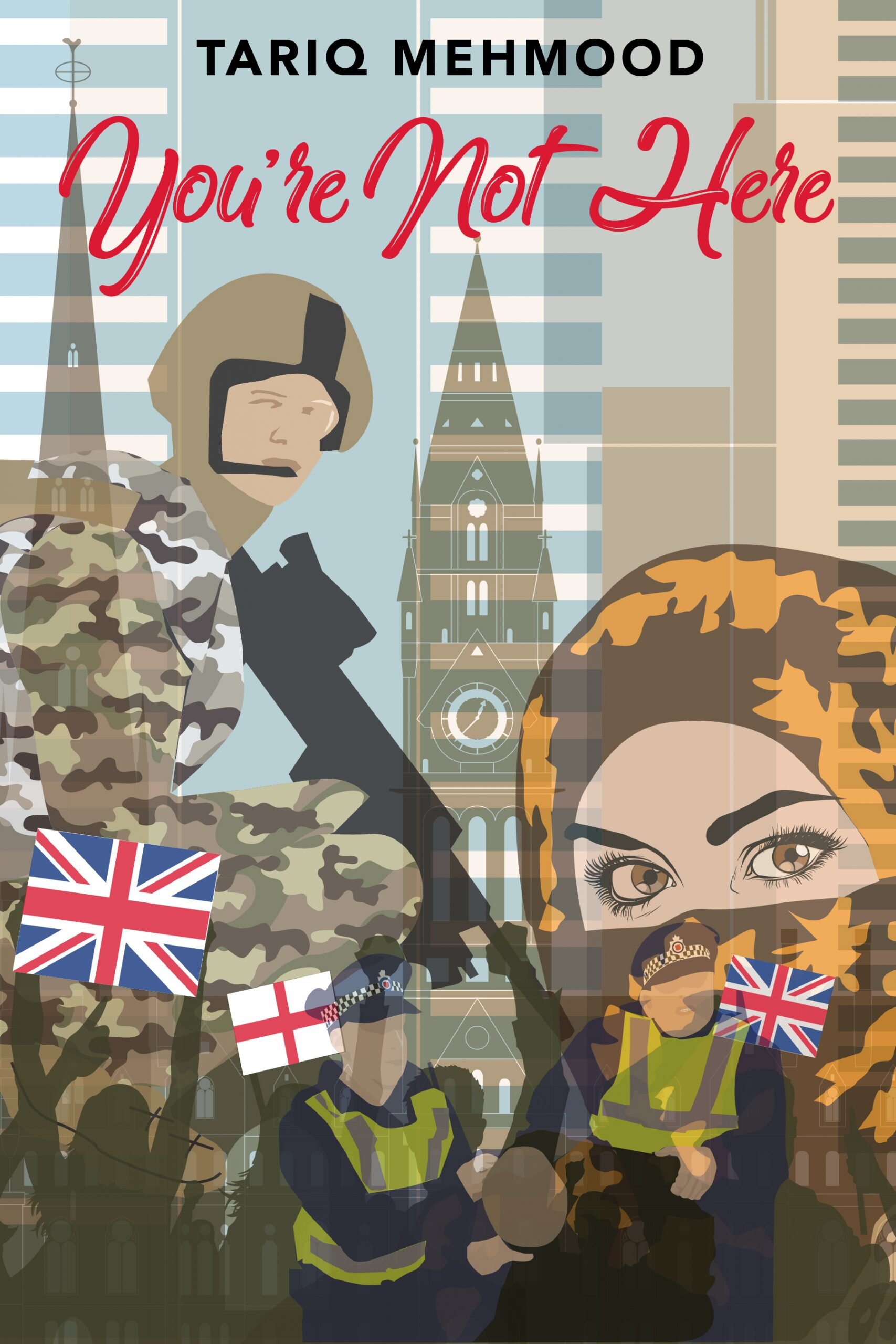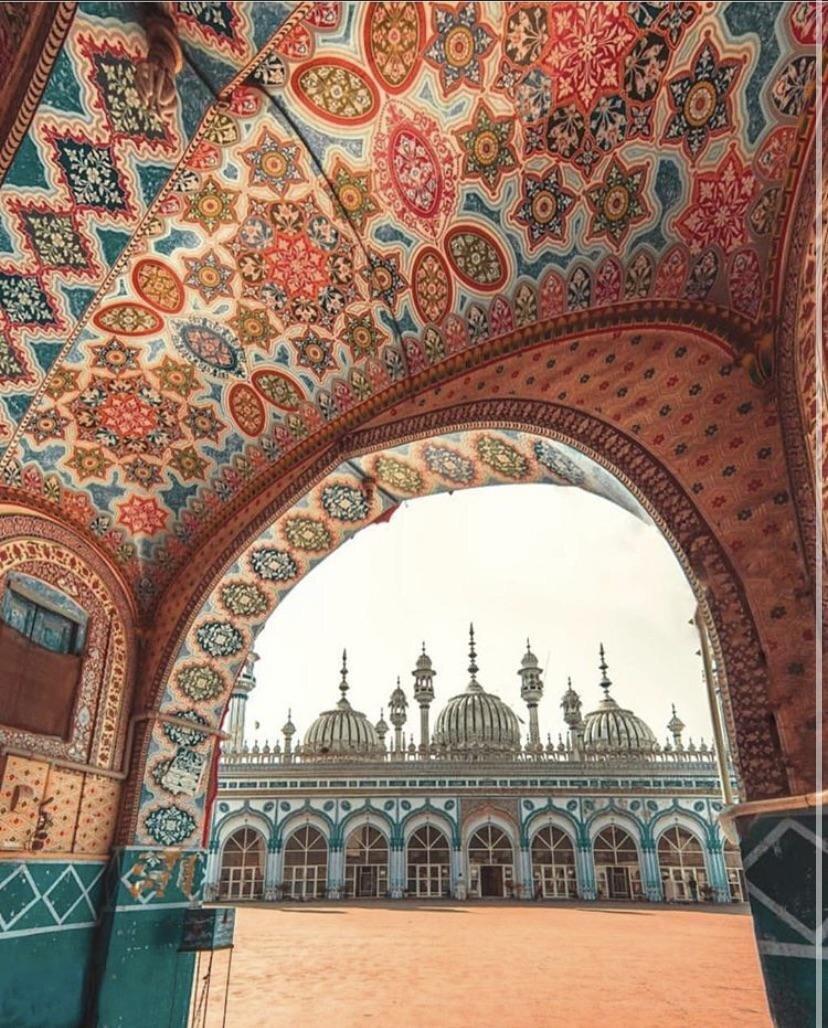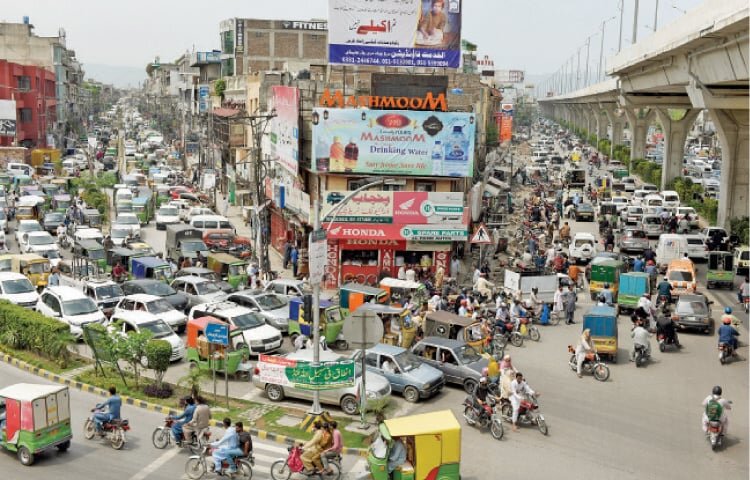Tariq Mehmood
Many of the alcoholics in the northern English town of Bradford described 30-year-old Saleem Khan as a god-fearing atheist; others said he was a high-functioning sharp-eyed drunk who always managed to land on his feet. However, everyone had warned him not to go and live in Pakistan with his white girlfriend, Carol, especially pretending that she was his wife. But as with all things he did, when he had made up his mind, he ignored all sober advice, and moved to Pakistan. Before going, however, he did manage to bribe a local Mullah from the new mosque in Manningham to issue him with a fake marriage certificate, as this being the time of the rule of General Zia ul Haq in Pakistan, extramarital sex could result in stoning to death.
Being a man of the world, Saleem Khan was well aware that Christians and other non-Muslims were allowed a booze permit, and that not only could they get alcohol legally, but it was also cheap. The permit allowed six units of booze at controlled rates. One unit was equivalent to one liter of spirits, or a crate of 24 one-liter bottles of beer.
Shortly after arriving in Pakistan, as he was settling into his rented apartment in Rawalpindi, he asked his cousin Habib, if he could get a booze permit by converting to Christianity.
Habib, a mild-mannered retired solder, replied, “As you are a Muslim, you can be beheaded for this.”
“I am a Christian, can I not get one?” Carol had asked half-jokingly, trying to cover her head with a dupatta, a headscarf. This was something which she had reluctantly agreed to do in Pakistan, but she just could not get the wretched cloth to stay on top of her head.
Switching into Pothohari, his native language, Habib said to Saleem Khan, “She is your wife, and she will be considered now a Muslim.”
Carol understood enough of Saleem’s language to understand the gist of what had just been said and replied to Habib, “Saleem told me that people of The Book were allowed to marry each other without changing their religions.”
“Habib means, this is not a good thing,” Saleem Khan explained to Carol.
“I understood what he meant,” Carol said, manoeuvring her dupatta.
They went silent for a few moments, and then Habib said to Saleem Khan, “Your mother-in-law is coming next week for Eid al Fitr.”
Carol snatched her dupatta completely off her head, rolled it up in her hand and tossed it across the room, saying, “You are not going to ask her to do this. She is a teetotaller, you know that.” Carol laughed. “Did you hear me?”
Of course, that is exactly what he did just a few days after Margaret, his mother-in-law arrived, and she replied, “It’s one thing coming to this godforsaken country, and I do that only because my half-wit of a daughter has followed you out here, but I will not partake in any of your nefarious schemes, and will certainly not break my moral codes, or participate in anything illegal. You are incorrigible. Incorrigible!” And before Saleem Khan could say anything, she turned her back on him and snapped at her daughter, “I don’t know what you see in this man!”
“Aw, mum, he’s not that bad,” Carol replied, “not always.”
“Don’t you go curling that nose at me,” Margaret said, “especially in that baby voice of yours.”
“It’s true,” Saleem Khan said, giving Margaret a hug, and added, “I’m not that bad, like she says. And you’re all right, you know.”
Margaret pushed him away, and adjusted her fluffy greying hair.
“You won’t have to break any laws. I swear upon the Almighty.”
“Since when did you start believing in God?” Margaret asked.
Saleem Khan smiled back at his mother-in-law, and she relented.
Saleem Khan explained to Margaret that after she got the permit, for which she would have to do nothing other than be present with her passport at the appropriate permit giving office, following that they would get four crates of beer and two bottles of whisky. What he didn’t explain was that in this way he could maximize the effects by knocking back chasers.
The next morning, Saleem Khan borrowed Cousin Habib’s car, a temperamental silver-coloured 1979 Toyota Corolla, and with Margaret in the passenger seat, dressed in a green Kameez on top of brown trousers, set off to see the District Commissioner, or DC Saab as he was called, where the permits were issued. It was a short honking drive along the Murree Road in Rawalpindi, which as ever was heaving with people, buses, trucks, rickshaws and desperate ambulances trying to weave their way through.
After reaching the local council office complex, Saleem Khan parked the car under the shade of a peepal tree and opened the door for Margaret, who got out, tourist guidebook in hand, and looked up into the branches of the tree.
Saleem Khan caught hold of a passing clerk by his arm and asked, “Brother, where do I get liquor permit forms from, and where is DC Saab’s office?”

The clerk, a small bespectacled man with dyed black hair and tired eyes, smiled respectfully at the white madam, and then at Saleem Khan, with the look of a man who had been asked the most difficult question of his life. He placed a hand on his chin, and began to search the depths of his memory.
Then it occurred to Saleem Khan that it was not the clerk’s memory that was failing but his own, and so he slipped him a ten rupee note. The clerk looked back in anger. Saleem Khan put another ten rupee note in his hand and the clerk smiled, nodded and popped into the nearest office.
“Did you just give him a bribe?” Margaret asked after the clerk left.
“Of course not. I would never do that,” Saleem Khan lied.
“But I saw you give him some money.”
“Registration fee,” Saleem Khan replied.
Just then, the ceiling fan they were standing under burst into life, as did a number of air-coolers around the outside of the offices near by.
“The power just came back,” Saleem Khan said.
Saleem Khan looked at his watch a few times, whilst Margaret read her tourist book.
“That tree you parked the car under, isn’t it a peepal tree?’ Margaret asked, without taking her eyes off the book.
“It is,” he replied.
“It says in this book that, from ancient times onwards, it has been believed by Hindus and Buddhists that when the wind blows through the tree, it sings like the lute. The peepal is considered the tree of life. It has medicinal properties which help blood circulation, help you to see better, help with your breathing and help to rid your body of poisons.”
The clerk was back, form in hand, which he gave to Saleem Khan and pointed to the office from which he had come, saying, “You must fill form, and go there,” and then disappeared into a maze of corridors.
The fan under which they were standing turned reluctantly round and round, getting stuck on every other turn, slowing down and then jerking into action again. The force of the jerk almost pushed it off its overhanging hook.
“That’s just not safe,” Margaret said nervously, as bits of old cement from the ceiling fell down around her.
“It’s been up there for so long, it doesn’t know how to fall,” said Saleem Khan.
“I’ll wait over there by the peepal tree. It looks really nice.”
“That’s fine, you relax, I’ll sort everything out,” Saleem Khan nodded. “I just need your passport.”
Margaret handed Saleem Khan her passport and walked away towards the tree. He read over the form, ran to a photocopier stall, got the required number of photocopies, completed the form and went into the office.
It was a large room with two desks piled high with ancient ledgers and folders. A door at the far end led into another room where the DC Saab sat. Two clerks, both men in their late forties, sat behind their old Remington typewriters. One was reading a newspaper, and the other was slowly sipping tea. As Saleem Khan entered, the clerks looked at him for a moment, quickly assessed his importance, and resumed their activities.
Saleem Khan was wearing a white shalvaar kameez, which had become crumpled and stained. He stood holding the application form for a moment, and then asked, “Who do I give this application form to?”

The tea drinker took a slurping sip and held out his hand. His colleague sucked on his teeth and nodded. Saleem Khan placed the form, along with the photocopies, in the tea drinker’s hand, who started to read it, and kept on scrutinizing it for a long time.
Without raising his eyes from the form, the tea drinker pointed to a worn out old bench and said, “Please sit down.”
Before stepping towards the bench, Saleem Khan glared at the clerk, thinking: you’ve seen this form hundreds of times, you thief. You are not getting a single rupee out of me.
The bench wobbled a little and groaned as Saleem Khan sat on it. The tea drinker pursed his lips and continued reading the form, nodding to himself every now and again. Eventually, he stapled copies of Margaret’s passport to the form and placed it on a pile in a tray next to him. He finished his tea and started typing with the index fingers of his hands, with a speed that would have shamed most professional touch typists.
“Can I take the form to DC Saab?” Saleem Khan asked after a while.
“It has to be signed by AC Saab first,” the clerk replied, without taking his eyes off the typewriter.
After staring at the form for about fifteen minutes, Saleem Khan asked, “Sir, when will AC Saab sign this application?”
“When he receives it, of course.”
“Gee. Gee. Yes, of course,” Saleem Khan concurred through gritted teeth, still thinking: you are not getting anything out of me, you bastard.
Forcing a smile, Saleem Khan asked, “Sir, when will my application be taken to AC Saab?”
The clerk finished typing his line, pushed the return carriage, and replied, “When Peon arrives and takes it.”
“I am sorry to ask you, sir, but when will Peon Saab arrive?”
The clerk rolled out the paper from the typewriter, separated the top from the carbon copy, placed the typed page behind him, fitted a new sheet of paper, wound it round the roller, looked up at Saleem Khan, and said, “These peons are not like the peons of olden days. They come when they want to, and no one cares. Our peon has not shown up for work for the last three days, and only God knows what has happened to him. Usually they do other jobs on top of government jobs, you know.”
“He has not been here for three days!” Saleem Khan said in disbelief.
“Three days,” the clerk nodded.
Saleem Khan slumped back and sat dejectedly for a while, trying to work out if it would be better for him to get off his high horse and pay the bribe. He looked into the clerk’s beady eyes, trying to work out how much he was likely to charge. The clerk’s unblinking eyes betrayed nothing.
OK, you son of a blind donkey, Saleem Khan thought, getting up off the bench, you are worth no more than 50 rupees. Stepping towards the clerk, he asked, “And where does AC Saab sit?”
The clerk rolled his eyes towards his colleague, who was still reading the newspaper.
Saleem Khan opened his mouth and was about to break into obscenities, when the desperate boozer inside him cautioned: calm down, Saleem, you say what you are about to and you can kiss goodbye to the permit.
The clerk sighed heavily and handed Saleem Khan the form, which he took over to AC Saab, who put the newspaper down and took the form, saying, “Thank you,’ in English.

AC Saab read over the form, signed and stamped it, checked it again, and scribbled something down before handing it to back to Saleem Khan.
AC Saab asked the other clerk, “Go check if DC Saab is inside and available.”
The clerk stood up, knocked on the door, went in and came back out a few moments later. He took the papers from Saleem Khan, went back inside, came back out again and nodded at Saleem Khan, who walked in.
DC Saab was sitting behind a huge desk on a reclining chair.
“Please sit down,” DC Saab said, pointing to a chair opposite him.
Saleem Khan sat down.
DC Saab ran his eyes over the application form, took off his glasses and said, “I know you abroadi types. You lot go to foreign lands and marry white women for one purpose only.” He paused, looked at Saleem Khan and went silent.
Fuck it and fuck the permit, Saleem Khan thought during DC Saab’s contemplative silence. I ought to twat this bastard right now. But the thought of losing six units prevailed, and Saleem Khan just sat there and lowered his head in humiliation.
“And your type will marry any sort of a white woman,” DC Saab said, clearing his throat. “The reason is very clear to me. Yes, indeed. You go from Pakistan, single, and bring back one of these white women with you on your return. And the reason you do that is so that you can bring them here and get them to get you a permit.”
“With all due respect, DC Saab, I am not as old as I look, sir, and I had a love marriage with my wife.”
“Young man, I have seen many abroadis. And I have seen those who have come back here, just like you, with white women who were old enough to be their grandmother.”
“This lady is not my wife, DC Saab. She is my sas, my mother-in-law.”
“Only last week, an abroadi came here. He was like you, a young man. He was married to a woman who was eighty.”
“DC Saab, maybe they were in love,” said Saleem Khan, “but …”
“Love!” DC Saab slapped the table, letting out a hearty laugh. “Lust and liquor! Oh yes, that I can understand, and I can understand the pleasures of old women, oh yes.”
“DC Saab, let us leave these complicated matters aside for today. I have come to do a small job on behalf of my mother-in-law.”
DC Saab checked the form, scribbled something on it, opened a drawer, pulled out a stamp, spat on it and thumped the application form. He passed it over to Saleem Khan, who on seeing the stamped form had difficulty holding back his tears. He wanted to rush forward and hug DC Saab, who contrary to all assumptions had not asked for any bribe. But when Saleem Khan read through to the number of approved units, he noticed that DC Saab had written ‘2′.
“DC Saab, I think you have made a mistake. She is entitled to six units.”
“Your mother-in-law is over 80 years old. She should not drink so much, but as she is a guest in our country, I am allowing just two units.”
“But, sir, she is not yet even 82. You have no idea how much she can knock back.”
“It would be such a disgrace to our country’s honor if something happened to her because of drinking. It would be on my conscience forever,” DC Saab said.
“Oh kind sir, believe me, she can knock back a bottle of whisky and not even burp. And she would regard it as a major insult to be denied her entitlement.”

DC Saab leaned across the desk and took the form back from Saleem Khan. He thought for a while, picked up a pipe, knocked out the old tobacco and refilled it. Holding it between his teeth, he lit it. Then, letting out a plume of smoke, he asked, “And where does your family come from?”
“Jhelum.”
“Yes, I know Jhelum very well. Jhelum people, they are very generous.” DC Saab said, pulling the pipe out of his mouth.
“The ones I know are real miserly bastards, sir,” Saleem Khan replied.
“Oh! Not so, young man. I have served in Jhelum for over twenty years, and Jhelum-wallahs, they truly have big hearts.”
DC Saab changed the ‘2′ to ‘3′, and handed the form back to Saleem Khan.
Saleem Khan looked at the form, placed his hand on his heart, and said in a voice filled with disappointment, “Sir, everyone I have ever met in Jhelum is a miserly bastard who is always trying to fleece the needy. I mean, they wouldn’t even piss into the mouth of someone dying of thirst.”
He can stuff the other three units, Saleem Khan cursed inside his head, and stormed out of the office. When he got outside, he looked at the form again. The ‘2′ had been changed to a ‘3′ in black ink. And so he changed it to ‘6′, and grinned all the way back to Margaret.
Margaret, leaning back against the trunk of the peepal tree, was fast asleep.
Saleem Khan opened all the doors of the car to cool the interior, and as he was doing this Margaret woke up and said, “You took a long time.”
“Time in this country is not measured by a clock,” Saleem Khan replied, getting into the car.
After Margaret got beside him, Saleem Khan closed his eyes momentarily and, as per his habit when driving this temperamental car, prayed inside his head for the car to start, which it did.
The shop which sold booze on permits was close to the staff entrance at the back of the Pearl Continental, a five-star hotel with a tree-lined drive and landscaped gardens. It was about a mile or so from DC Saab’s office block.
Saleem Khan’s heart sank when he saw the size of the queue; a long line of men, snaking from the hole in a wall that served as the shop and disappearing behind some trees at the bottom. Saleem Khan and Margaret walked silently to the end of the queue, and stood at the back under the shade of some poplar trees.
A choukidar, a guard, a stocky dark-skinned man dressed in a khaki shirt and shorts with a cane in one hand and a cigarette in the other, marched down the queue, ensuring that everyone remained in an orderly line.
“This is ridiculous. It is going to take all day,” Margaret huffed.
“It won’t take that long,” Saleem Khan mumbled, “honestly.”
The choukidar came towards the two of them, prodding the men who were a little bit out of line. He was drenched in sweat. His lips were red from chewing paan. He glared at Saleem Khan, who checked to see if he was out of line.
The chaukidar walked up to Saleem Khan, spat out the paan residue into a bush close to the neatly cropped lawn behind him, nodded towards Margaret and hissed, in broken but functional English, “You shameful servant. Making English lady wait in line. So much heat.”
Margaret immediately turned towards Saleem Khan and barked, “You should have known better than to do that!”
The choukidar beamed and said, “Madame, please to come.”
Margaret tossed her head and followed the choukidar, and Saleem Khan followed her, head bowed.
“Madame need new servant. I find good man,” the choukidar said.
“I will make sure he learns his lesson,” Margaret grinned.
When the choukidar was out of earshot, Saleem Khan whispered, “Please ask for four units of beer and two units of whisky. Please insist on beer. If that fails, get as many beers as you can. Get them to mix and match with anything to make up any remaining units, and please make sure you get the classic Murree beer.”
Margaret swung her shoulders and walked towards the choukidar, who had pushed the queue back so that she could get to the window.
“I want four units of classic Murree beer and two units of whisky, please,” Margaret asserted, passing the permit through the window to a man.
“Very sorry, Madame, not too much beer today,” the man replied from inside the shop.
“I am entitled to six units, altogether, and I want four units of beer.”
“Madame is very correct. But as you know, Eid is coming very soon. And it is because of the Eid rush – lots of demand – that beer is rationed. I am very very sorry, but I cannot give four units of beer to Madame.”
“What do you mean, Eid rush? This is a Muslim country. How can there be a rush for beer on an Islamic celebration? Islam does not allow this sort of thing.”
“But Madame, there is always Eid rush. This year is even more rush than before.”
“Margaret, please do not get into a religious discussion. Just…”
“This is unbelievable!” Margaret ignored Saleem Khan and continued, “How can drinking be justified? Let alone on Eid.”
“Madame, you can take two beer units and four whisky units, or Madame can go away.”
“I demand all my units in beer,” Margaret insisted.
“Please just take what you can,” Saleem Khan implored.
Margaret looked at him for a moment, as though to reprimand him for interrupting her, and turned towards the window and said, “Okay.”
Margaret stood in the shade of the trees and looked around at the hotel’s beautifully maintained garden, whilst Saleem Khan loaded the booze into the boot of the car. She watched him punch, and open and shut the boot lid a few times, and then once it was shut again, he patted the lid on top with a kiss, and beckoned Margaret to leave.
“Why did you do all that with the boot?” Margaret asked, getting into the car.
“Just checking, like. Sometimes it is a bit temperamental, and has to be punched just above the lock to open; and sometimes it just opens when the car goes over a bump,” Saleem Khan replied.

The Murree Road was its same chaotic fume-choked self as ever. They were inching forward along the road when Saleem Khan remembered Margaret walking back to the car; she had not been holding the booze permit in her hand, and he asked her, “Did you get the permit back?”
“No. What for?” Margaret asked.
“It doesn’t matter.” Saleem Khan’s heart sank.
But it did.
“Why did you ask, then?” Margaret said, swatting a fly.
“It’s my fault, really. I should have reminded you to collect it. But never mind, everything will be okay, inshahallah.”
Margaret was a bit puzzled by Saleem Khan’s comments, as all the allowance of the permit had been purchased. She pushed herself back into the seat, took out a handkerchief from her purse, held it across her nose and looked out at the long line of traffic through a cloud of smoke coming out of the exhaust of an artistically decorated bus which was overloaded with passengers, some of whom were dangling out of the back door. As she was watching the bus, and all the other ancient vehicles on the road, it occurred to her that the reason Saleem Khan was upset at her not having collected the used permit was that he was going to try some fraudulent trick or other with it, and said smugly, “Well at least you can’t reuse it.”
“Reuse what?”
“The permit. That’s what you’re upset about, isn’t it?”
Saleem Khan let out a long exasperated sigh by way of a reply, which hid the real reason for his unease. It was illegal to transport alcohol without a permit.
Just then, the car jerked a couple of times and the engine cut out. He turned the ignition key a few times, but in vain. Angry motorists honked and swore at him. Getting out of the car, he asked Margaret, “Will you please drive? We need to bump start the car. I’ll push. It’ll start with just a little shove.”
“I am not driving in this madness,” Margaret snapped back. “Besides I’ve never started a car like that and even if I could, I wouldn’t do it.”
“We have two choices,” Saleem Khan said, leaning through the driver’s window.
“Oh, God – look out!” Margaret screamed as she saw a rickshaw coming directly towards Saleem Khan.
He looked around and tensed for the impact, but it missed, as did the cars, vans and all other manner of vehicles that followed.
Saleem Khan became more nervous when he saw a policeman, who was standing under the canopy of a roadside café, looking at them.
Leaning back into the car, Saleem Khan said, quickly, “Either I push and you bump start, or you push and I do it.”
“Oh, get in,” Margaret hissed, getting out of the car. “Let’s just get out of this hell.”
Saleem Khan got back into the driver’s seat. With one eye on the policeman, he put the car into second gear, pushed the clutch in, and waited for Margaret to push.
“It is too bloody hot,” Margaret yelled as soon as she touched the back of the car.
Saleem Khan noticed the policeman leaving the shade and walking towards them, and shouted, “Please, push with your bum. Just hurry.”
“I can’t do it,” Margaret replied. “Give me a cloth or something.”
The policeman quickened his pace and reached them before Saleem Khan could reply. He went to the driver’s side and cursed Saleem Khan, “Have you mother-fucking drivers no shame. How can you make a woman, especially an English Madame gee, push your car?” He turned to Margaret, pointed to the shade he had been stood in, and said, “Madame gee, go! Stand!”
In the inside mirror of the car, Saleem Khan saw Margaret walking towards the shade.
“I will push. You start this mother-fucker of yours, and then take Madam gee home,” the policeman said, walking to the back of the car and adding more expletives as he went.
Saleem Khan held his breath and prayed that the boot lid did not spring open. He was in luck. The car started with just a shove from the policeman. Saleem Khan revved it a couple of times, and caught the policeman in a cloud of exhaust fumes.
“It is an old car, kind sir,” Saleem Khan apologized. “May God bless you.”
“I don’t need His blessing, I need yours,” the policeman said, placing an open hand in front of Saleem Khan.
“I am a poor driver, trying to make a living,” Saleem Khan said.
“You have maem, a white woman, in your car, and you have no money!” the policeman said. “I gave you a push, not a chalan, not a warrant. And you could give a little blessing instead of showing off to this old gori, this white woman.”
Pushing five rupees into his hand, Saleem Khan asked angrily, “What is going to become of this country when a little push from a policeman comes to this?”
“To hell with the country,” the policeman replied, throwing the five rupees into the car. “I am not a beggar. I am a policeman. A government servant!”
“Just pay him more,” Margaret said, getting into the car.
“No, I won’t!”
“Pay him, for God’s sake. I am burning up in this oven.”
“No,” Saleem Khan repeated, putting the car into gear.
The policeman snatched the keys out of the ignition. The engine continued to run.
“Have you got all the papers?” the policeman demanded.
“Give me back the keys now, sir. The car may stall again,” Saleem Khan replied, giving him a bundle of documents.
The policeman flicked through the documents and asked, “Where is the radio licence?”
“For God’s sake, pay him!” Margaret insisted. “Let’s get out of this place.”
“It doesn’t work,” Saleem Khan replied, ignoring Margaret.
“It does not matter if the radio does not work. What matters is that you have a fully tokened radio licence,” the policeman said pompously.
Saleem Khan accepted defeat and offered the officer twenty rupees. The policeman shook his head, twisting his moustache. He thought for a moment and said, “I don’t think you are the type of a driver who would have a spare tire in the boot as well. That is now an offense.”
The mention of the boot sent a shiver down Saleem Khan’s spine, and he handed the officer a hundred rupee note, saying, “And I thought you were a man of God.”
“God has His place, sir,” the policeman said, giving the keys back to Saleem Khan, “and may he look after you.”




